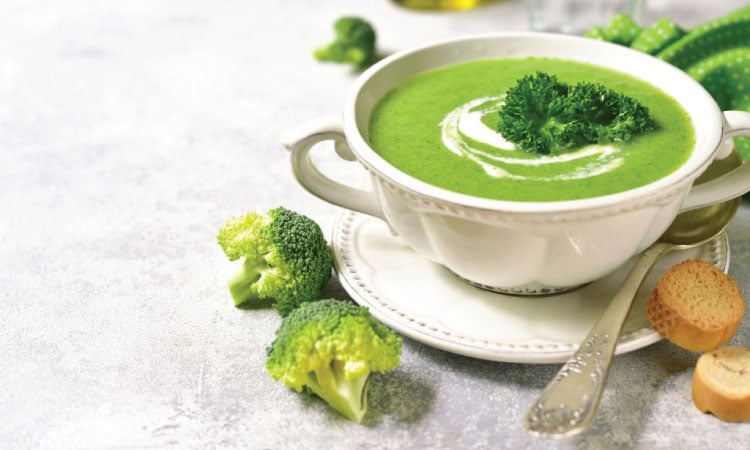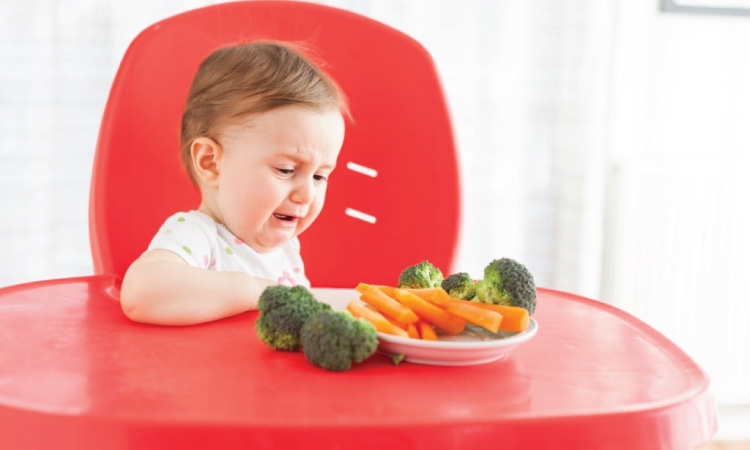Broccoli is known for being an immensely healthy vegetable, full of useful nutrients. So you may be wondering if giving broccoli for babiescan reap the same benefits for them.
The many nutrients in broccoli can undoubtedly be beneficial for babies. But what exactly are these benefits? Are there any risks associated with giving broccoli to babies? When is a good time to introduce broccoli to babies?
This article sheds some light on these topics.
Is Broccoli Good For Baby Food?
Broccoli is an amazing cruciferous vegetable coming from the family of cabbage and cauliflower. It is loaded with fundamental nutrients that are crucial for the optimal growth and development of a baby.
The vitamins and minerals in broccoli comprise Vitamin C, Vitamin B6, Vitamin K, Vitamin A, folic acid, iron, potassium, and zinc. The protein level in this verdant vegetable is much higher than many other vegetables
Broccoli is a rich source of fiber as well. The nutritional profile of broccoli, thus, signifies how advantageous it is for the growth and development of the baby.
Related Reading: 9 Early Signs Of Intelligence In Babies
When To Introduce Broccoli For Babies?
Always keep in mind that the developmental timeline of a baby need not always be the same as that of another baby of the same age. The same goes for digestion as well. Many mothers try to include broccoli as one of the first foods (around 6 months).
If cooked and pureed without lumps, some babies may have it without any issues. However, generally, broccoli is not recommended as a great first food due to various reasons. This is most importantly due to the increased risk of gas formation. Another reason is the digestive system will not be apt enough to digest broccoli. This can create several digestive issues.
Also, when it comes to broccoli for babies, never feed more than the moderation quantity. Feeding the baby without crossing the point of moderation is an effective solution to many possible digestive issues.
Therefore, instead of one of the first vegetables, it is best to delay its introduction until the baby turns 8 months. 8-10 months is the right time to start giving baby broccoli. By then their digestive system will be more developed and hence the risk of indigestion and gas formation will be significantly reduced. Also, the baby will be able to absorb all the nutrients and hence will be able to reap all its benefits without fail.
When it comes to introducing a new food to a baby it is always better to consult with your baby’s pediatrician. This is because sometimes the generalization may not always applicable for all babies.
How Do I Introduce Broccoli To My Baby?

This depends on when you choose to introduce broccoli to your baby. If your baby is showing no signs of indigestion, and you choose broccoli as one of the first solids, you can puree it. Broccoli puree for babies can be mixed with other sweet-tasting vegetable purees like sweet potato puree to enhance its taste. But then again, first foods are ideally not mixed so that any indigestion/issues can be easily tracked.
However, if you are introducing broccoli after 8 months, you can make yummy and creamy broccoli soup for babies
Related Reading: 12 Signs Of Low Milk Supply You Should Pay Attention To
On the other hand, if you plan to give broccoli for baby-led weaning (broccoli is one of the best first foods for baby-led weaning) here is how you should introduce it to the different age groups of babies.
Introducing broccoli to 6 to 9 months old babies
Broccoli naturally comes with a perfect little handle. For this, cut the broccoli keeping as much of the floret stem as possible. This way, your baby will be able to pick up the florets and put them in their mouth without much effort. You can serve whole florets of steamed broccoli keeping the head down and stem up.
The baby will be able to pick it easily this way. However, make sure the florets are well steamed and so soft so that you can easily mash them with your finger and thumb. Even then, if still, the stem of broccoli makes you tense, you can cut large florets in half, through the stem, before serving.
Introducing broccoli to 9 to 12 months old babies
This is the period the babies develop their pincher grasp. Now they can pick things with their thump and pointing finger. Now you can give them streamed soft broccoli florets without bothering the size. They can pick both small and large florets. Just make sure it is soft.
Related Reading: When Can Babies Eat Eggs?
Feeding broccoli to12 to 24 months old babies
By this time, your little one has become an advanced eater. Now the baby has teeth to grind the food finely, you can reduce the duration of steaming/cooking broccoli. Now you can use broccoli for baby finger food.
At this age your child can enjoy crunchy broccoli, you can give broccoli florets stir-fried in butter or olive oil. You can try different recipes while incorporating broccoli into the diet of a 1-2-year baby.
Note*: Broccoli contains non-heme iron which the baby’s body finds harder to absorb. Serving broccoli with a food rich in vitamin C (at the same meal) will facilitate iron absorption.
What Are The Benefits Of Broccoli For Babies?

Broccoli has been deemed as one of the most nutritious vegetables, and its is not without reason. In the western countries, broccoli is introduced to babies at an early age. Here are some of the top benefits of broccoli for babies
1. Helps to strengthen the immune system of the baby
Broccoli contains a remarkable amount of vitamin C. Vitamin C is a crucial factor for strengthening the immune system. Phytochemicals in broccoli also help to boost the immune system. Therefore, including broccoli in a baby’s diet helps to strengthen their immune system.
2. Enhances the development of the brain and nervous system
Broccoli is an excellent source of potassium. Potassium helps to promote regular muscle growth in babies. It also helps to improve blood flow and therefore may help with the development of the brain and nervous system. Also, Vitamin K in broccoli will help to improve memory in children.
Related Reading: 12 Best Foods For Baby Brain Development
3. Feeding broccoli to babies keeps their eyesight healthy
Broccoli is loaded with beta carotene and Vitamin A. these elements contribute to the growth of healthy retina in babies. Babies who have broccoli regularly have sharper eyesight.
Broccoli is also rich in lutein. Lutein is a kind of carotenoid that protects the retina of human eyes from the harmful rays of the sun. It has a very important contribution in making the eyesight better.
Even though not at a large level, broccoli is complemented with B-complex vitamins and minerals such as phosphorous. They also play a key role in keeping the eyesight healthy.
4. Helps to prevent anemia in babies
Iron deficiency anemia in babies more often affects babies 9 to 24 months. While breastfeeding, the baby gets an adequate amount of iron from breast milk. Moreover, the iron in breast milk is in an easily absorbable form.
However, when they move to solids, this pumping in of iron eventually decreases as the baby relies on solids more than breast milk. This increases the risks of iron deficiency anemia.
One of the main minerals found in broccoli is Iron. Therefore giving broccoli to babies helps to boost the hemoglobin level in the blood. This in turn helps to prevent anemia. Protein found in broccoli also helps to fight anemia in babies.
5. Broccoli provides benefits of calcium to babies
Broccoli contains a good amount of calcium. This mineral is very important for the bone development of the baby. Eating broccoli helps the baby to develop healthy bones and teeth.
6. Provide benefits of omega 3
Broccoli is a rich source of ALA (alpha-linolenic acid), one of the omega-three fatty acids. ALA is essential for the overall development of babies. It is especially important for the development of the brain and retina of the baby.
Adequate intake of Omega 3 fatty acid is found to enhance hand-eye coordination in babies. It also helps to reduce inflammation and allergic reaction in babies. Therefore, broccoli for babies is highly beneficial in this aspect.
7. Relief from diarrhea
Diarrhea in babies is something we should not take lightly. Detecting and taking measures to prevent dehydration is very important. Unlike in adults, diarrhea in babies can lead to severe dehydration which can put the life of the baby at stake. Loose motions in babies is mostly treated by home remedies, but some serious infections might even warrant medical intervention.
Broccoli soup for babies is an excellent way to cure diarrhea. This nutritious soup not only to helps restore the amount of water that is lost from the body but also supplies essential nutrition.
8. Broccoli prevents constipation in babies
Babies are prone to constipation. Broccoli holds a significant amount of soluble fiber that facilitates the bowel movements of the baby. The fiber in broccoli also acts as a laxative. Therefore giving broccoli for babies helps to prevent constipation.
Related Reading: How To Use Orange Juice For Baby Constipation (10 Months & Above)
Does Broccoli Cause Gas In Babies?

When it comes to the risks of giving broccoli for babies, there are no other significant risks than its tendency to cause gas in babies. It is a particular sugar in broccoli – raffinose- that potentially triggers indigestion and gas in babies.
How to choose and store broccoli for infants
The benefits of broccoli for babies highly depend on the quality of broccoli used. Therefore it is important to pick the right one for your baby.
- First of all, make sure Broccoli weighs for its size. Firm broccoli that weighs according to its size means this green vegetable is internally healthy.
- Next, make sure the bright green color of broccoli is uniformly shaded. Never choose one with yellow or gray parts.
- Last but not least make sure there are no loose florets and the stalks are firm with compact heads.
If stored improperly, broccoli turns inedible in a couple of days. On the other hand, if stored in the refrigerator as it should be, the freshness of broccoli remains intact for as long as five to seven days.
- The first thing you should keep in mind is, never wash this vegetable prior to storing it in the fridge. This is because even though little moisture retains its freshness, more wetness increases the chances of molds thriving in the florets making the whole vegetable inedible
- You can either wrap fresh broccoli in a ventilated bag or you can simply put broccoli in an appropriate container filled with half an inch of water. Make sure the bushy part points up and the stem part points down and touches water. Keep this container as it is in the fridge
Broccoli is an incredibly healthy and nutritious vegetable. Broccoli for babiesis a good choice as it has several benefits. However, there are still risks you need to keep in mind and precautions you need to take.
If you do that, then there is no end to the benefits your little one can have from eating broccoli! It is one of the healthiest foods you can give your child.
FAQs
Broccoli has not comes under the listing of things that pose choking hazards for babies. However, hypothetically any finger food poses that risk if not sliced or cooked appropriately for the baby.
Nevertheless, you can reduce the chance of choking by steaming the florets until soft, and then slicing each floret lengthwise (into half) along the stalk. If you are more concerned, you can even cut off the entire stalk.
In general, broccoli for babies is safe and beneficial. However, as it is rich in fiber, giving broccoli for baby every day may increase the risk of bowel irritation and gas formation.
So rather than having it every day, it is better to have it once or twice a week. There are a lot of other vegetables your baby should explore and attain the benefits.
Steaming is the healthiest method of cooking broccoli. It is found that microwaving this vegetable end up losing some amount of nutrients. Likewise boiling broccoli loses nutrients, especially, Vitamin C content to great extent (more than microwaving).

